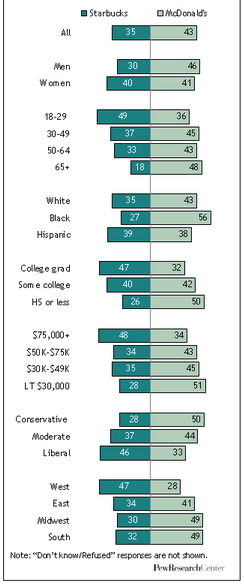Our Sunday Chart
Responding to a 2009 Pew Research Center survey, 2260 adults indicated whether they would, “prefer to live in a place with more McDonald’s or more Starbucks.”
As you can see below, 43% said McDonald’s, 35% said Starbucks and 22% had no preference. According to the study, a key variable is your political inclination. Liberals tend to favor Starbucks over McDonald’s.
More specifically, if you are female, politically liberal, 18-29 years old, earn more than $75,000 a year, a college graduate, or religiously unaffiliated, you probably prefer Starbucks. On the other hand, a McDonald’s loyalist tends to be male, to earn less than $30,000, to have a high school degree but not college, and/or to be Protestant or Catholic.

The Bottom Line and Economists’ Preferences
The Pew survey reminded me of research about economics majors that was in the news. Discussing the connection between education and civic behavior, a New York Fed Staff Report concluded that students who majored in economics tended to be Republicans. Taking a huge analytic leap, does that means that economists prefer McDonald’s?
Our bottom line: Taking another leap to some basic economics, we can say that monopolistic competition shapes the behavior of McDonald’s and Starbucks. The characteristics of monopolistic competition include many sellers with a similar product, sellers creating an individual, unique identity, and sellers having some control over price. The competitive behavior of beauty salons, supermarkets, and clothing manufacturers is also shaped by a monopolistically competitive market structure.





